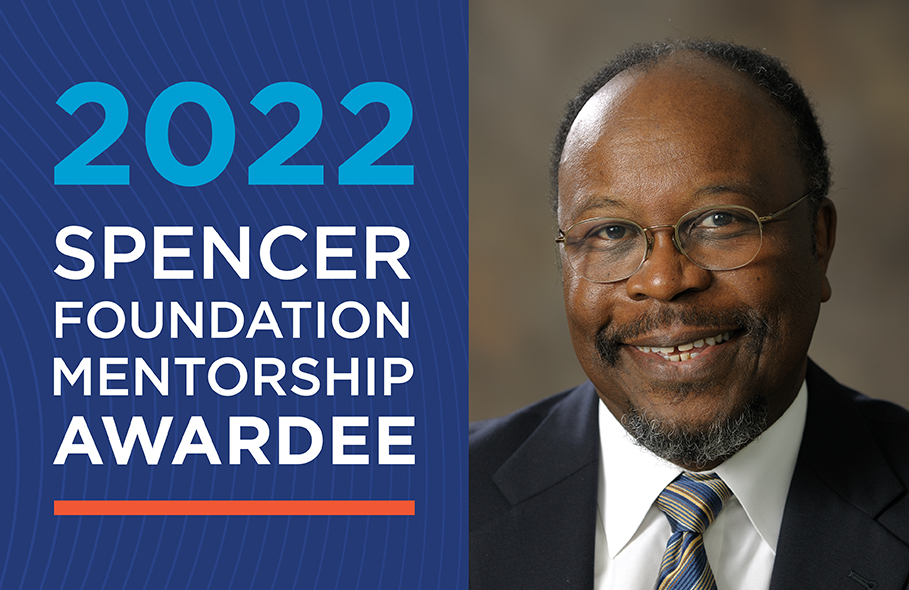Professor William Trent Wins 2022 Spencer Foundation Mentorship Award
by Ashley Lawrence / May 4, 2022

Dr. William Trent, professor of Education Policy, Organization and Leadership and Sociology at the University of Illinois Urbana-Champaign has been named a 2022 Spencer Foundation Mentorship Award recipient. Trent was recognized during Spencer’s recent reception at the American Education Research Association (AERA) annual meeting in San Diego, California.
Education alumna Dr. Ezella McPherson, Ed.M. ’08 EPS, Ph.D. ’12 EPS, served as nominator and organizer for her former Ph.D. dissertation adviser and mentors’ official award nomination package. McPherson coordinated with 51 individual endorsers, including three recommendation letter writers, to compose a compelling argument for Trent’s selection.
The Spencer Foundation is dedicated to the belief that high-quality research training and mentoring is a cornerstone of education and worthy of recognition. The Spencer Mentor Award provides a $15,000 grant—intended to support ongoing mentorship—to awardees who have demonstrated extraordinary contributions to supporting the research training and career trajectories of graduate students and junior scholars who engage in education research, broadly construed.
“We wanted to tell the story of his mentorship from his students’ perspective, and I think that was key,” says McPherson. “We each had our own personal story of how Dr. Trent had affected us as humans and scholars, and when we shared our stories his cumulative impact was clear. My story wasn’t enough on its own—we needed a community of stories.”
Compiling the endorsements, she realized what set him apart: Professor William Trent had mentored the next generation of education equity scholars at Illinois.
McPherson credits Dr. Derek A. Houston, Ed.M. ’10 EPOL, Ph.D. ’16 EPOL, for initially proposing the idea of nominating Trent via the Black and Brown UIUC EPOL Ph.D. Alumni Facebook group. Houston, an associate professor at Southern Illinois University Edwardsville, summed up Trent’s influence this way:
“For me, Dr. Trent is love and that love is at the core of his engagement with me and other students. That love permeates through all the scholars who Dr. Trent has directly or indirectly mentored, and shapes how I engage with the students who have now trusted me to guide them in their educational pursuits. It is that love that impacted my life long before Dr. Trent became my mentor and it is that love that continues to (in)directly impact lives everywhere.”
As Houston’s idea quickly gained traction among alumni, McPherson decided to take a lead role in the effort. She says organizing the award nomination was a labor of love that she would do all over again.
“Simply put, without Dr. Trent’s mentorship many of us wouldn’t have completed our advanced degrees,” she says. “My first faculty adviser really didn’t want to advise master's students. My second adviser ended up leaving U of I, but strongly recommended that I talk with Dr. Trent about my dissertation work. He became my third and final adviser. I said, ‘I have to stick with him’ and he stuck with me.
“Dr. Trent has been a positive role model in my life ever since. Personally, I also dealt with a number of deaths of family members and close friends—five, actually—while I was in graduate school, and I hadn’t reconciled with the grief and loss,” says McPherson. “Dr. Trent walked me through the process of dealing with that, and he really understood what I was going through during that time.”
With the support of current EPOL Department Head Dr. Yoon Pak, McPherson worked with staff in EPOL to recruit Trent’s students and colleagues to join the growing list of award application endorsers. In her recommendation letter, Pak wrote (excerpted):
“I cannot think of another deserving scholar who, for nearly four decades at the University of Illinois, worked so tirelessly to advance the work of graduate students and junior scholars in educational research … the profound influence of his role as mentor and researcher also comes in having helped to diversify faculty at major research institutions. The majority of his doctoral advisees have been and are students of color and often first-generation college graduates … his daily interactions with students and young faculty were critical in transforming higher education. Professor Trent brought his whole self to academe and showed all of us that this was a place where we belonged.”
Additionally, McPherson says, the College’s Dissertation Database proved to be an extremely helpful tool to locate Trent’s former students for their stories of impact. Within a few weeks, she had accumulated multiple statements attesting to Trent’s powerful commitment to mentorship: his “ethic of care”, compassion, being a role model, encourager, listener, providing advice, wisdom, and support; being approachable, fostering relationships and a sense of belonging, and instilling confidence in his students.
“I feel like the department of EPOL was a community-based place and space, and Dr. Trent made it a community for us, so we had to think big with this nomination,” says McPherson. “He simply embodies mentorship, and I’m so excited for Dr. Trent to be recognized with this award.”